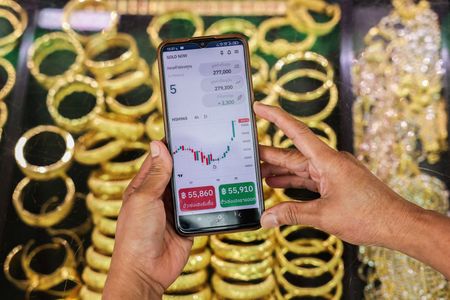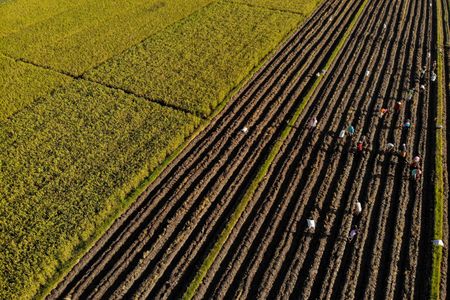By Orathai Sriring and Thanadech Staporncharnchai
BANGKOK (Reuters) -Thailand’s gold trade is pushing back against central bank plans for a tax aimed at curbing a currency rally, warning the measure would hammer businesses and undermine the Southeast Asian nation’s role as a major trading hub for the metal.
Strength in the baht currency, now hovering near a four-year high, is seen as a threat to exports and tourism, two key drivers of Southeast Asia’s second largest economy, which is struggling with U.S. tariffs and high household debt.
“If they impose taxes, the industry will collapse,” said Kritcharat Hiranyasiri, president of MTS Gold, referring to the central bank, as he warned that taxes on baht-denominated online gold trading would choke the industry.
“There’s no clear timeline yet. They’ve only asked for various data, and we’ve told them they need to study it first.”
Such a tax would add to costs for investors, he added.
NO FINAL DECISION YET
The tax on gold trading is among the measures the Bank of Thailand is considering to slow the baht, although it has not made a final decision.
The currency’s rise of about 6.1% against the dollar this year makes it Asia’s fourth-best performer, on gains driven by a weak dollar, a current account surplus and gold trading, the central bank says.
Gold trading in Thailand has expanded into digital platforms, including the government-backed Pao Tang app, which partnered with gold trading firm MTS Gold for online transactions.
Thailand’s consumer gold demand ranks 10th globally and fourth in Asia after China, India and Vietnam, The World Gold Council says, and has increased steadily to 49 metric tons in 2024 from 37 tons in 2021.
Gold traders have dismissed claims that the industry fuels the baht’s strength, saying it is tied more to other factors, rather than the precious metal.
TRADITIONAL INVESTMENT
Thai households traditionally hold gold as savings or investment, often selling during hard times or when gold prices surge.
“Investors are waiting to buy gold, viewing it as being on an upward trend,” said Tanarat Pasawongse, managing director of gold trading group Hua Seng Heng. “With gold prices up 40% this year, there will be people selling as well.”
Jitti Tangsithpakdi, president of the Thai Gold Traders Association, warned that taxes could jeopardise Thailand’s thriving market and reputation as a trading centre.
“If taxes are imposed, it will ruin everything. We’ll lose our leadership position,” Jitti said, adding that Thailand’s gold exports and imports were the highest in Southeast Asia this year. “Malaysia is already trying to compete with us.”
Thailand exported 114 tons of gold worth $8.76 billion and imported 199 tons worth $15.4 billion last year, the commerce ministry said.
In the period from January to August, gold exports stood at 88.4 tons, worth $8.73 billion, while imports of 200 tons were worth $12.9 billion.
Gold imports are settled in dollars, increasing demand for the greenback, while exporters convert dollar proceeds into baht, boosting the Thai currency.
Thailand also reported 35% quarterly growth in bar and coin demand in the second quarter of 2025, outpacing declines in other Southeast Asian countries, the World Gold Council said.
CAMBODIA’S RISING GOLD IMPORTS
While Thai gold exports are a small share of total exports, large-scale shipments could be a factor strengthening the baht, the Thai commerce ministry said.
In the spotlight is the value of Thai gold exports to Cambodia, which rose to $2.35 billion in the first eight months of 2025, compared to $3.04 billion for the whole of 2024.
Cambodia’s rising gold imports might reflect domestic concerns about its riel currency, spurring larger holdings of gold and foreign currencies, a spokesperson of the Thai finance ministry said.
The central bank says it is working with the relevant agencies to investigate gold shipments to Cambodia.
“The trade is legitimate on both sides,” MTS Gold’s Kritcharat said.
(Reporting by Orathai Sriring and Thanadech Staporncharnchai; Additional reporting by Kitiphong Thaichareon; Editing by Clarence Fernandez)










